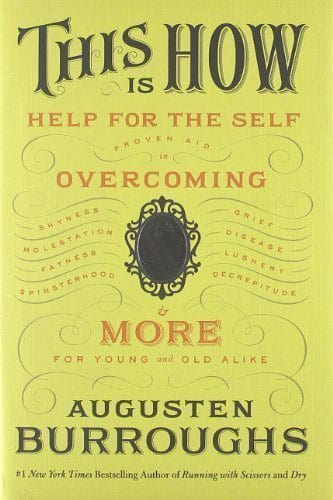This heart-gripping letter from the Damsel in a Dress, Lisa Walters, will change the way you think about people who are undiagnosed forever:
I’ve been reading This is How: Help for the Self by Augusten Burroughs to help me make sense of my life with lupus. It’s one of those self-help books for people who don’t like self-help books. It is beautiful and staggering. Burroughs knows how to speak to just about anyone who feels bad about themselves.
I saw myself in almost every chapter and devoured the advice like someone starving.
But then I read the chapter titled “How to be Sick” and that’s when I felt a little disconnected. I realized that there is a large group of sick people who won’t be able to relate to that advice. That chapter is written for people who get diagnosed with an illness, but there is a branch of those sick people who never get the answers they need.
I was one of them for years.
Reading “How to be Sick” reminds me of all of those years before my lupus diagnosis when I knew for sure there was something really bad happening inside of me, but no one could tell me what it was. I felt like I couldn’t mourn the way you get to mourn when you’re diagnosed with something. I felt like I couldn’t turn to people for support the same way others could.
Which non-profit charity should I seek help from when I don’t know which disease it is?
I would often find myself at a bookstore staring at the health/self-help section blankly, wondering if someday there would be a place for me on the shelf, aching to be able to pick up a book that was written for me. I lingered in some somber, paralyzing purgatory. And I stayed there for years, tossed around by doctors, misdiagnoses, questioning glances and awkward shrugs. Should something that agonizing be omitted from self-help books? I thought my story of being undiagnosed deserved to be sitting there on a shelf somewhere in the chronic illness section.
I searched and searched.
Augusten Burroughs writes:
“The day of your diagnosis will seem like the end of your life and the beginning of your death. Now, instead of a future when you contemplate what’s next, you will see only a large gray CAT scan machine blocking your view of the terrifying unknown behind it. The first thing you understand is that when something is new the novelty or newness itself carries weight. This makes the message weigh more. Bad news is even worse when you are first told of it. The diagnosis will never be as terrifying as it is the first day it is given to you.”
But that advice isn’t universal, because for some people that day never comes. Or at least it feels like that day will never come.
They know they are sick. They know their bodies and they know something isn’t right anymore. For years they feel a certain way and they interpret that way to be what normal is, and then one day they wake up and all of a sudden that normal is gone, replaced with a deep ache they don’t recognize.
Or slowly, over the course of a few months or years, that feeling that they know as normal will become distant, and that deep ache will creep in so gradually that they won’t notice at first. They’ll think it’s a virus, food poisoning or something simple like a pinched nerve that will un-pinch itself soon enough. But the normal doesn’t ever come back. And even though they know something inside of them has veered off track, doctors dismiss them. If they don’t see proof right away they are waved out of clinics and told to go home.
For those people, they never get to experience the dread of the diagnosis. And that’s probably the worst thing of all, if you think about it. Because at least when the diagnosis happens, as much as it knocks the wind out of you, you’re given the time and the resources to comprehend that disaster and you’re given the proper encouragement to heal. Someone will cover you in a blanket, offer you some hot tea and tell you that someday it will be okay, at least now you know what it is, the worst has already happened, you can figure out how to go on.
It’s really tragic that there are so many people out there just wishing for that.
Being sick without a diagnosis is like driving a car and seeing a transport truck coming right for you. You grip the wheel in anticipation of the horrific crash, but it never comes. You just get stuck in this loop of fear and impending disaster. You keep staring at the headlights and want for it to be over so you can either die or learn to walk again or something, anything, to move forward. You can’t attempt to recover from the crash until the crash happens. It’s that simple. The thing needs to shatter before you can pick up the broken pieces.
And then to just pile more bricks onto your heavy, aching shoulders, people start telling you that you’re making it all up. It’s in your head. You deliberately veered into oncoming traffic. You must have wanted to live like this. It’s nothing. It’s always nothing. A want for attention is all.
“Once you’re in it, it’s okay,” Burroughs says of a diagnosis.
But these people never really get in it, do they? That’s a pleasure they never really get to have. And that’s heartbreaking, if you ask me. To feel like I am privileged to have been diagnosed with lupus is absurd, but it is how I feel. I’m one of the lucky ones, I always think, when I remember all the people I met who were once just like me, searching everywhere for answers.
I hope that someday a young girl who is sick and desperate for answers can go to a bookstore and find a section where she belongs. I want her to pick up a book, open the cover and read the words “I understand.” I want her to stand there in that crowded bookstore aisle, flip through a couple of pages with her fumbling fingers and lock her eyes onto a paragraph that can connect her wholly to every other sick person in the world. I want her eyes to fall down that page and well with tears as she sees the words:
“I believe you. Don’t second guess your instincts. Don’t listen to the people who tell you ‘but you don’t look sick.’ I know you are sick. I know you don’t want to be sick. I understand that what you are going through is really hard, and it’s amazing, really, that you haven’t given up or fallen into a million pieces. And even if you did I wouldn’t blame you, because this is a battle that you shouldn’t have to fight. You should only have to fight against your disease. You shouldn’t have to spend all of your energy battling disbelieving doctors. You shouldn’t have to scream for help. You deserve answers and I really hope that you get them someday. And if the day comes when you are diagnosed it will not feel like the beginning of your death; it will feel like the beginning of a hopeful new chapter. You are strong. You are loved. You belong here. Your story is just as important as the rest.”
She needs that more than you will ever know.
 Lisa Walters is a creative writer and chronic illness advocate from Newfoundland, Canada.
Lisa Walters is a creative writer and chronic illness advocate from Newfoundland, Canada.In her blog, a Damsel in a Dress, Walters shares her journey as a 20-something living with a chronic illness. Her bubbly demeanor, but heart-felt and honest accounts of her life is a powerful force within the rare disease community. If you want to check out some more stories about Lisa’s life living with lupus, hop on over to her blog!
Share this story now! People need to know the true struggles of those who are undiagnosed or misdiagnosed.










